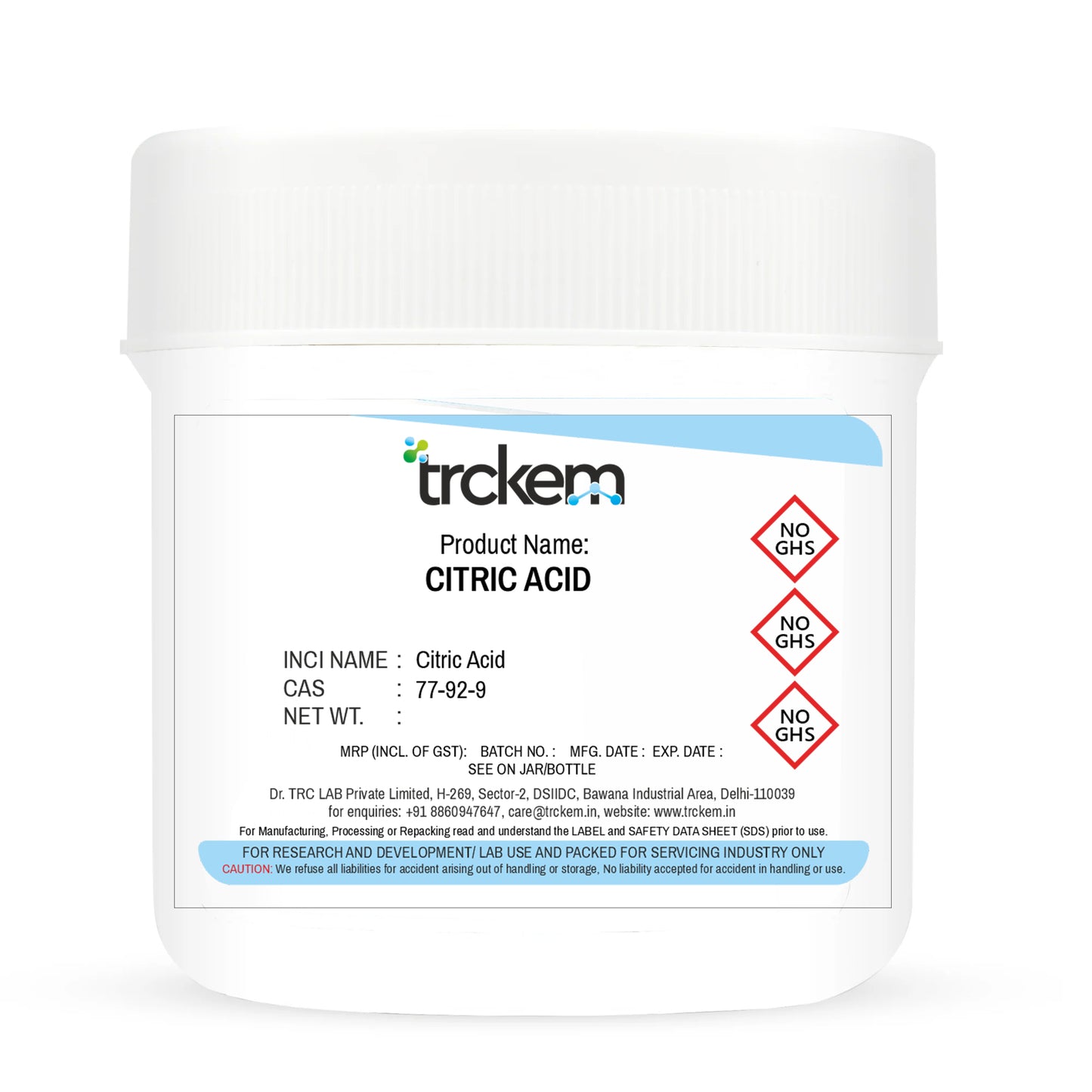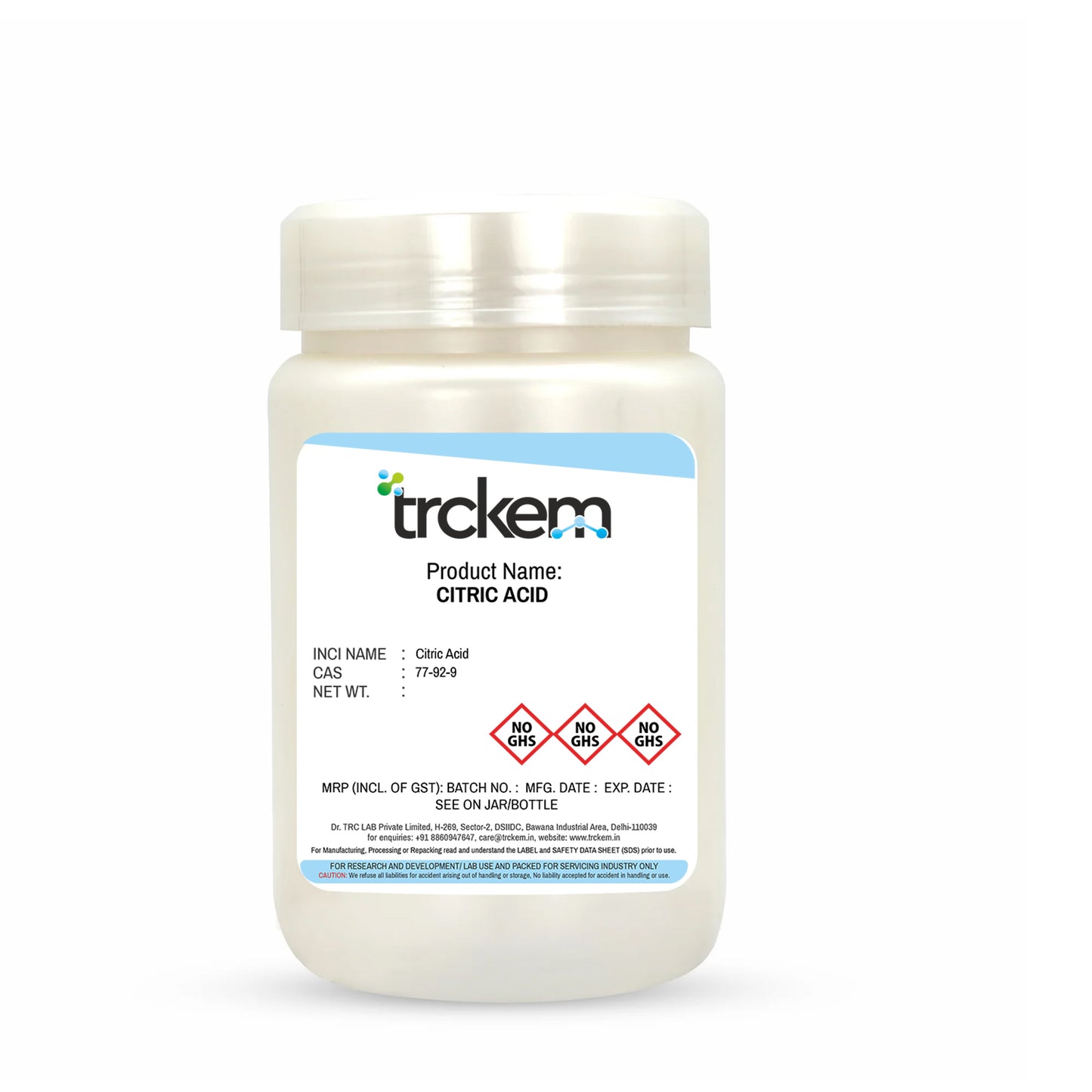

THE STORY OF CITRIC ACID

Citric Acid: The Natural pH Balancer & Brightening Agent
Citric Acid is a natural alpha hydroxy acid (AHA) derived from citrus fruits and used in cosmetics for pH adjustment, exfoliation, and antioxidant preservation. It helps maintain product stability, brighten skin tone, and balance acidity — making it essential in skincare, haircare, and bath formulations worldwide.

Fermented from Natural Sugars for High-Purity Cosmetic Use
Citric Acid is produced by fermenting natural sugars (glucose, molasses, or corn syrup) using Aspergillus niger microorganisms. The resulting solution is purified and crystallized to yield a high-purity, food- and cosmetic-grade acid. TRCkem offers fine and granular grades suitable for creams, cleansers, bath products, and exfoliating formulations.

Balance. Brighten. Preserve.
Key functions in cosmetic & personal-care formulations:
✅ Adjusts pH to maintain product stability & skin comfort
✅ Provides gentle exfoliation to renew and smooth the skin
✅ Acts as a chelating agent, binding metals that cause discoloration or oxidation
✅ Supports preservative systems and boosts antioxidant efficacy
✅ Natural AHA for brightening and anti-aging skincare
Used in: face toners, serums, body washes, shampoos, bath bombs, toothpaste, and effervescent tablets.

Natural, Effective & Regulated for Controlled pH Use
• Typical use level: 0.1–5% depending on pH target & formula type
• Fully water-soluble; add to aqueous phase under stirring
• Compatible with most preservatives & surfactant systems
• ECOCERT & COSMOS approved (when naturally derived)
• Safe for topical use — avoid excessive concentrations to prevent irritation
• Store cool, dry, sealed; hygroscopic material may clump under humidity
Formulator’s Queries, We Answered
1. What is Citric Acid?
Citric Acid is a naturally occurring weak organic acid derived from citrus fruits such as lemons and oranges. It is widely used in personal care formulations as a pH adjuster, exfoliant, chelating agent, and preservative booster.
2. What is the CAS number and INCI name of Citric Acid?
CAS Number: 77-92-9
INCI Name: Citric Acid
3. What are the benefits of Citric Acid in personal care products?
Citric Acid is valued for its:
pH regulation: Helps maintain the ideal pH balance in formulations.
Exfoliating properties: AHA (alpha-hydroxy acid) that gently removes dead skin cells.
Chelating ability: Binds to metal ions to improve product stability.
Preservative enhancer: Helps extend shelf life when combined with preservatives.
Skin brightening effect: Helps improve skin tone and texture.
4. How does Citric Acid work in cosmetic formulations?
Citric Acid functions as a multi-purpose ingredient, adjusting the pH of formulations to enhance stability and effectiveness. It also acts as a gentle exfoliant, promoting cell turnover for smoother, brighter skin.
5. Is Citric Acid safe for all skin types?
Yes, Citric Acid is generally safe, but higher concentrations may cause mild irritation in sensitive skin types. It is recommended to use it in controlled formulations to prevent skin sensitivity.
6. What types of personal care products contain Citric Acid?
Citric Acid is commonly found in:
Face cleansers & exfoliants
Shampoos & conditioners
Bath bombs & soaps
Serums & creams
Mouthwashes & toothpaste
7. Can Citric Acid be combined with other ingredients?
Yes, Citric Acid works well with:
AHAs (Lactic Acid, Glycolic Acid) for enhanced exfoliation.
Moisturizers (Hyaluronic Acid, Glycerin) to balance hydration.
Preservatives (Potassium Sorbate, Sodium Benzoate) for extended shelf life.
8. Does Citric Acid cause any side effects?
When used in appropriate concentrations, Citric Acid is safe. However, potential side effects include:
Mild irritation or redness in high concentrations.
Increased sun sensitivity (use sunscreen if applied to the skin).
9. What is the recommended concentration of Citric Acid in personal care formulations?
0.1% to 1% in skincare formulations as a pH adjuster.
5% to 10% in exfoliating products like peels and serums.
Up to 30% in professional-grade chemical peels (under expert supervision).
10. Is Citric Acid natural or synthetic?
Citric Acid can be naturally extracted from citrus fruits or produced through fermentation of sugars. Most commercially available Citric Acid is biotechnologically derived for cost-effectiveness and purity.
11. Where can I purchase high-quality Citric Acid for formulation purposes?
Citric Acid is available from cosmetic raw material suppliers. Ensure you choose high-purity, cosmetic-grade Citric Acid for safe and effective formulations.




